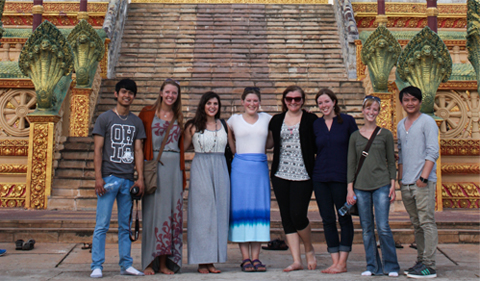Dr. Andrew Ross, Associate Professor of Political Science, is seeking an undergraduate research apprentice for his book project examining the way digital media are changing the landscape of moral and political engagement at the global level.
College of Arts & Sciences freshmen, sophomores and juniors are eligible for the Undergraduate Research Apprenticeship Pilot Program 2015-16. The program hires students to work on faculty members’ research projects.
Ross’ apprenticeship is for 10 hours a week for the 15 weeks of the Fall 2015 semester.
The Honors Tutorial College, in partnership with the Vernon R. and Marion Alden Library Endowment, the College of Arts & Sciences, the College of Health Sciences and Professions, the Gladys W. and David H. Patton College of Education, the Russ College of Engineering and Technology, the Scripps College of Communication, University College, and the Office of the Vice President for Research and Creative Activity, invites all interested Athens freshmen, sophomores, and juniors to apply for the 2015-16 research apprenticeships.
How to Apply
The deadline to apply is 5 p.m. on March 13. To apply for this internship, you must email Dr. Andrew Ross at rossa@ohio.edu. The email should briefly explain your qualifications and interest in the project (no more than three paragraphs) and have an attached resume. It is strongly recommended that you meet with an adviser in the Career and Leadership Development Center in Baker Center 533 to help you compose your letter and resume before applying for a position.
Global Sensitivity: Mediated Empathy and Political Connectivity in The Digital Age
Brief Description of Project: Work conducted in the context of the apprenticeship would contribute to my next book project, which investigates the impact of new communication technologies and practices on the formation of empathic connections across social, cultural, geographic, and political boundaries—a phenomenon I call “mediated empathy.” Empirically, the project focuses on three topics—humanitarianism, diplomacy, and global citizenship—that together allow for consideration of various forms of political action and various types of political actors, both state and non-state. Across these topical areas, the book examines the emergence of media-enabled sensitivities, global micropublics, and what I call the “piecemeal citizenship” characteristic of the digital age. My work on the book will require assembling resources from various disciplines, including political science, cultural theory, media studies, social psychology, and neuroscience.
Student’s Role in Project and Benefit to Student: A student research apprentice would help to organize, catalogue, and take notes on selected secondary materials. I have collected several hundred articles, books, and book chapters and have not had time to read many of them. A student apprentice would help me digest many of these sources by completing a kind of “questionnaire” summarizing key arguments and contextual attributes (i.e. disciplinary origin; primary interlocutors; etc.). The student apprentice will gain hands-on experience not just collecting materials but also contributing to the process of ‘connecting the dots’ and seeing how they plug into (or, as the case may be, do not plug into) to a larger theme and a synthetic project. I would work with the student intensively during the early weeks to help her or him generate clearer and more effective synopses of the research materials. The student would also gain some experience with Endnote, entering bibliographic data along the way.
Desired Qualifications for Apprentice (e.g. course background, skills, computer expertise, interest, etc.): The most important skills would be written communication, especially the ability to summarize complex ideas in a clear and concise manner. Attention to detail and ability to follow instructions would also be essential. Because the project is interdisciplinary in nature, I would look for a student with a solid grounding across a range of disciplines in the humanities and social sciences; the student need not be in political science. I would expect familiarity with library databases and with Microsoft Word; otherwise, no specialized skills are required in advance.




















Comments